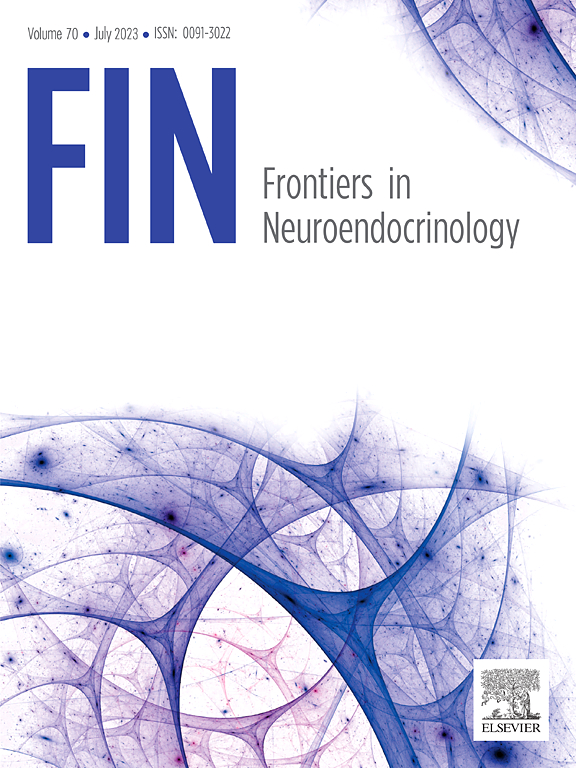A review of the effects of different types of social behaviors on the recruitment of neuropeptides and neurotransmitters in the nucleus accumbens
IF 6.7
1区 医学
Q1 ENDOCRINOLOGY & METABOLISM
引用次数: 0
Abstract
There is a lack of understanding of the neural mechanisms regulating the rewarding effects of social interactions. A significant contributor to this lack of clarity is the diversity of social behaviors and animal models utilized to investigate mechanisms. Other sources of the lack of clarity are the diversity of brain regions that can regulate social reward and the diversity of signaling pathways that regulate reward. To provide some clarity into the mechanisms of social reward, this review focused on the brain region most implicated in reward for multiple stimuli, the nucleus accumbens, and surveyed (systematically reviewed) studies that investigated the relationship between social interaction and five signaling systems implicated in the regulation of reward and social behavior: oxytocin, vasopressin, serotonin, opioids and endocannabinoids. Moreover, all of these studies were organized by the type of social behavior studied: affiliative interactions, play behavior, aggression, social defeat, sex behavior, pair-bonding, parental behavior and social isolation. From this survey and organization, this review concludes that oxytocin, endocannabinoids and mu-opioid receptors in the nucleus accumbens positively regulate the rewarding social behaviors, and kappa-opioid receptors negatively regulate the rewarding social behaviors. The opposite profile is observed for these signaling systems for the aversive social behaviors. More studies are needed to investigate the directional role of the serotonin system in the nucleus accumbens in the regulation of many types of social behaviors, and vasopressin likely does not act in the nucleus accumbens in the regulation of the valence of social behaviors. Many of these different signaling systems are also interdependent of one another in the regulation of different types of social behaviors. Finally, the interaction of these signaling systems with dopamine in the nucleus accumbens is briefly discussed.
不同类型的社会行为对伏隔核内神经肽和神经递质的募集影响的综述。
人们对调节社会互动奖励效应的神经机制缺乏了解。造成这种缺乏明确性的一个重要因素是社会行为和用于研究机制的动物模型的多样性。缺乏清晰度的其他来源是可以调节社会奖励的大脑区域的多样性和调节奖励的信号通路的多样性。为了更清楚地了解社会奖励的机制,本综述将重点关注与多种刺激奖励最相关的大脑区域——伏隔核,并调查(系统地回顾)了社会互动与参与奖励和社会行为调节的五种信号系统之间关系的研究:催产素、加压素、血清素、阿片样物质和内源性大麻素。此外,所有这些研究都是根据所研究的社会行为类型来组织的:亲和互动、游戏行为、攻击、社会失败、性行为、配对结合、父母行为和社会孤立。通过调查和组织,本文认为伏隔核内的催产素、内源性大麻素和mu-阿片受体正向调节奖励性社会行为,而kappa-阿片受体负向调节奖励性社会行为。相反,这些信号系统对厌恶的社会行为进行了观察。伏隔核5 -羟色胺系统在多种社会行为调控中的定向作用有待进一步研究,抗利尿激素可能不参与伏隔核对社会行为效价的调控。许多不同的信号系统在调节不同类型的社会行为时也是相互依赖的。最后,简要讨论了这些信号系统与伏隔核多巴胺的相互作用。
本文章由计算机程序翻译,如有差异,请以英文原文为准。
求助全文
约1分钟内获得全文
求助全文
来源期刊

Frontiers in Neuroendocrinology
医学-内分泌学与代谢
CiteScore
13.30
自引率
6.80%
发文量
62
审稿时长
68 days
期刊介绍:
Frontiers in Neuroendocrinology (FIN) publishes a wide range of informative articles including comprehensive reviews, systematic reviews, opinion pieces, and meta-analyses. While the majority of reviews are invited, we also embrace unsolicited reviews and meta-analyses, as well as proposals for thematic special issues, provided they meet our rigorous quality standards. In addition, we encourage authors to submit commentaries that concisely present fresh ideas or offer further analysis to delve deeper into the implications of an article published in our journal.
 求助内容:
求助内容: 应助结果提醒方式:
应助结果提醒方式:


